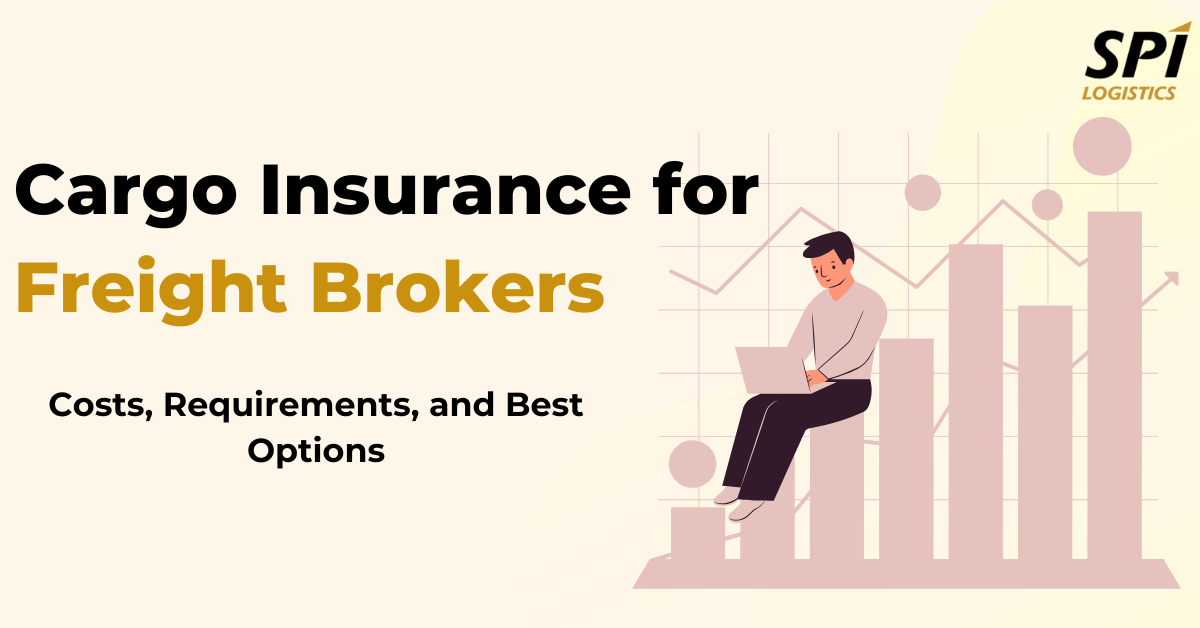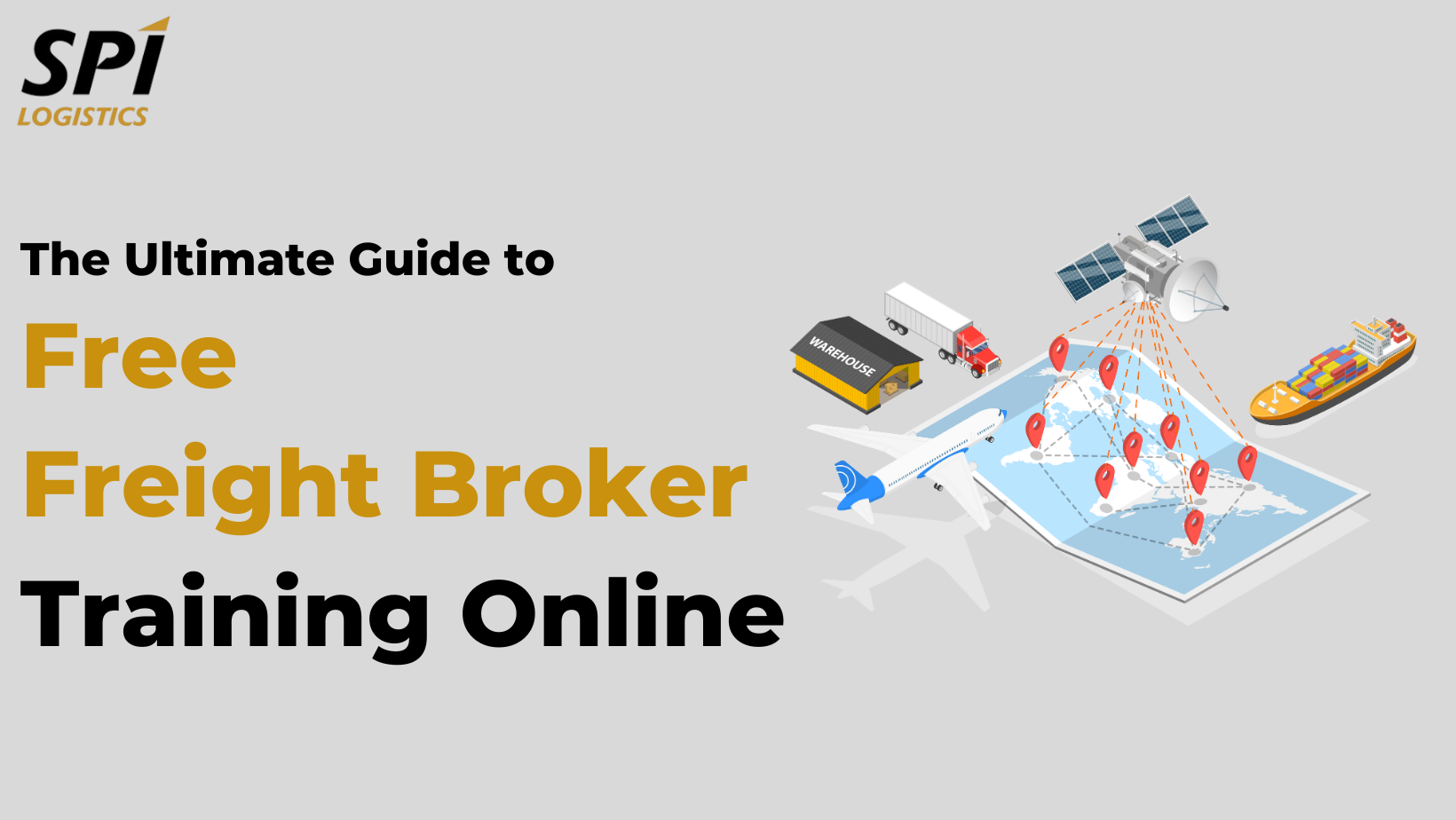A freight broker keeps things together within the logistics world, ensuring all freight movements are done efficiently and effectively. They help increase customer trust in their shippers and improve the overall movement of carriers. But what do they get in return for doing such an important job? And how much do freight brokers earn?
There is no singular answer to this question, but if you’re considering becoming a freight broker, you’ll want to know the possibilities of what you can earn. That’s why we’ve put together this comprehensive guide on freight broker compensation, looking at everything from average commission to how you can increase your overall income.
Let’s get started!
The basics of freight brokerage

The logistics industry is complicated, and it’s full of many processes that need to be handled. While people think of shippers and carriers when it comes to the supply chain, there needs to be someone who can handle the two together. This is what a freight broker does.
Ultimately, a freight brokerage, sometimes seen as a freight agent, is an individual or company that acts as a middleman between carriers and shippers, ensuring the handoff between the two goes smoothly and that the freight arrives at its final destination safely and on time.
Shippers like to work with freight brokers because they relieve the stress of negotiating with carriers, planning the best route, and tracking the freight at all times. Carriers also appreciate the work of brokers because they help boost their earnings while traveling fewer miles.
Commission-based compensation structures
As we’ve mentioned, there are two types of freight brokers – independent contractors or a whole brokerage that is part of a larger logistics company.
If you’re an independent licensed freight broker, you’re typically paid a commission percentage, as well as some extra for shipping the freight to the carriers. A larger company will usually get a base salary plus commission, fees, and benefits.
Let’s look more into the commission structure usually used for freight brokers.
What is it?
Freight brokers typically earn their income through commissions, which will be a percentage of the total shipping amount that they negotiate between the shipper and carrier. It is a form of incentive for brokers as it encourages them to look for the best deal for their clients and also ensures they bring in the most cash flow so they get paid more.
The freight broker commission percentage you receive depends on a range of factors but usually ranges between 15 and 30 percent of the transportation fee. Factors that affect the percentage include your level of experience, the complexity of the shipment, and the current competitive rates in the industry. But we will discuss this a bit later.
While some might ask for a different freight broker compensation structure, commission is the main one used within the industry. Here are some of the pros and cons of this payment method:
Pros
Incentivizes performance
The best thing about a freight broker commission structure as the main payment process is that it encourages them to work harder. They know that they’ll earn more if they secure the best deals with clients and optimize the logistics within the supply chain.
Unlimited earning potential
Unlike people who earn a base salary, there is an endless amount a freight broker can earn. For example, they aren’t stuck to gaining $2,000 in their bank each month for the same amount of hours. Instead, if they secure as many deals as possible, they can increase their monthly income.
Flexible work environment
Working for a commission means you often aren’t stuck in an office, as you have to communicate and meet with other clients. You also don’t always have to work for a boss, as if you’re an independent contractor, you can choose your own hours and clients.
Cons
Although you have unlimited earning potential as a freight broker, you also have income volatility. You aren’t always guaranteed the same amount of money every month. You might do better one month than another, making it hard to determine your earnings.
Risk of unpredictable cash flow
There might be times when you have no cash flow at all, especially if it’s a bad season or your clients don’t need you during certain periods. This can cause financial stress and means you must budget during your better earning months.
Pressure to prioritize sales over service
When incentivized to make the best deals, you might not care as much about your clients and the service you provide them. Seeing money as the end goal often makes us stop and forget about fostering trust and a good relationship with ongoing customers.
What influences freight broker payment?

We previously brought up that a few things affect the commission percentage you might receive as a freight broker. Here are some of the main influences:
Client relationships and negotiation dynamics
It’s very often that freight brokers set their own commission percentage, but the client needs to be able to accept the payment terms. Due to this, if you have a good relationship with your customers, you have more leeway to negotiate higher commissions with them. You also have the opportunity to secure long-term contracts, which means you don’t go without money in certain months.
You also need to have good negotiation tactics to persuade newer clients to accept your commission terms. If you’re good at securing the best deals in your role, then you most likely have a good sales head. If not, it’ll get better with experience. Either way, you can maximize your earnings with the best negotiation strategy.
Market conditions and industry trends
What’s going on in the logistics industry, or the specific market you work within, will also affect how much you get paid as a freight broker. For example, if there’s a high demand for freight brokers, then you have the upper hand to ask for a higher commission. When there’s more competition within your field, you might find it a lot harder to secure higher-paying clients.
It’s always a good idea to stay up-to-date on current trends within your market, as well as the latest news. If there are supply chain disruptions, shippers might look for brokers who can bypass this issue and find the best way to move their freight. You can then ask for more money. However, you need to have the head to adapt your strategies and overcome challenges.
Regulatory considerations and compliance
Regulations and compliance considerations also affect your freight broker salary. If you don’t have the right credentials, you most likely won’t be following the right rules, and you can’t charge much. For example, you must adhere to regulations set by authorities such as the Federal Motor Carrier Safety Administration (FMCSA) and gain licenses such as the Motor Carrier (MC) number and the Freight Broker Authority (FFA).
Educational requirements of a freight agent
You don’t need too many qualifications to become a freight agent, as many people learn on the job or take internships and apprenticeships first. Therefore, freight brokerage companies tend to only look for freight agents that have a high school diploma. Of course, having a certificate or associate degree may put you ahead of the competition, but it isn’t something that’s required.
A reputable freight broker business will rarely hire you as their freight agent if you have no education combined with no experience, therefore, you should keep this in mind if you’re considering this as a career.
How freight brokers invoice and collect payments

Doing the job is an important part of being a freight broker, but how do you ensure you’re actually getting paid at the end? Once the goods have been successfully moved from point A to point B, you can then initiate the payment process and ask for your commission. This involves an invoicing process, but you need to be careful to ensure all information is correct and you’re getting paid the right amount.
You most likely have agreed-upon rates with your shipper or sometimes the shipping or trucking company, as well as the payment terms. The industry standard is getting paid between 30 and 90 days, but you might want to offer a quick payment option to speed this up. You can incentivize your clients to pay faster by offering a discount.
Brokers also often use a freight factoring company, where a factor (a third party) will purchase the broker’s receivables at a discount. This means you can receive your commission immediately at a lower rate, but it offers you the liquidity you need to keep operating and accept new shipments from other clients. Invoice factoring means the factor then has the duty of receiving the full payment amount from the shipper.
How much do freight brokers make per load?
We’ve given you the average percentage you might expect to receive in commission as a freight broker, but how much will you actually make per load? The thing to remember is that freight brokers are usually paid on the gross margin of loads, which is different to other sales jobs that are paid on the gross revenue number.
We can’t tell you how much every freight broker makes per load, but we can help you determine how much you’ll make per load with your clients based on the gross margin
Gross margin = price charged to shipper – price paid to carrier
This is a simple formula that you can use each time you agree to a shipment. An example of using it is as follows:
$10,000 charged to customer – $3,000 paid to carrier = $7,000 gross profit margin or net revenue
How much do freight brokers make per load?
We’ve given you the average percentage you might expect to receive in commission as a freight broker, but how much will you actually make per load? The thing to remember is that freight brokers are usually paid on the gross margin of loads, which is different to other sales jobs that are paid on the gross revenue number.
We can’t tell you how much every freight broker makes per load, but we can help you determine how much you’ll make per load with your clients based on the gross margin
Gross margin = price charged to shipper – price paid to carrier
This is a simple formula that you can use each time you agree to a shipment. An example of using it is as follows:
$10,000 charged to customer – $3,000 paid to carrier = $7,000 gross profit margin or net revenue
How freight brokers can increase their income

One of the pros of using a commission-based pay structure as a freight broker is that you can earn as much as you’re capable of. There is no limit. So, if you’re not happy with how much you’re earning now, or you want to start off on the right foot as a new freight broker, here are some ways you can make more money:
Finding clients and building relationships
You can’t handle many of your key responsibilities as a freight agent without working under a freight broker. Therefore, you most likely won’t be the one looking for the clients, as that is what the company you’re working for does.
However, if you ever get put in charge of finding clients as a freight agent when working for a broker business, you can follow some of these tips:
- Look at clients down the supply chain
- Make cold calls to potential clients
- Reach out to connections of your current clients
- Offer a rewards program for recurring clients
- Offer to be back up to those who already have a freight broker
- Provide free audits before getting started
Take on more shipments
If you’re charging the max commission within the industry, but you still want to increase your freight broker profit, you will have to ship more freight. For example, if you’re only working with five shipments for a client per week, you’ll most likely have time to work with more. If this is the case, you’ll need to either ship more loads with your current client or take on new customers.
As an independent contractor, you can only ship as much freight as you have spare time; however, freight brokerage companies might have more opportunities for business. The more experience you gain, the more long-lasting clients you have, and the better your skills, the more shipments you’ll be able to work with.
Work with more valuable freight.
Not all shipments cost the same in the logistics industry. For example, if you’re only working with a shipment that’s worth a total of $1,000, a large company might not be as concerned as if they were to lose track of a shipment that’s worth $100,000. Therefore, they might not want to pay as much for a brokerage to work with a load with a lower overall worth.
Shippers who care about protecting their freight, especially when it contains high-value items, will want to work with the best of the best. This also means they’re willing to pay more. Therefore, if you’re working with valuable freight, you can charge more commission to guarantee high skills and quality outcomes.
Offer more services
As a freight broker, you have a job to do: ensuring freight gets from the shippers to the carriers and then to the end location without any hiccups. However, that doesn’t mean you offer the same services as your competition. For example, you might simply track your freight, but your competitor uses the latest technology plus gives real-time updates on where the shipment is. So, which one is the client going to choose?
You want to be ahead of the crowd and offer the most effective services that your competition doesn’t. You should also ensure your customer support and skills are top-of-the-line so you can develop strong relationships and make a name for yourself. By offering more and being the best in the industry, you will undoubtedly earn more.
Conclusion
How much freight brokers earn varies depending on the individual brokerage, but you now have a much better idea of your potential monthly income. If you’re looking at becoming a freight agent or broker, you know there are endless opportunities for income, especially when you’re on a commission structure.If you want to expand your opportunities as a freight broker and enhance your chances of earning big, then SPI Logistics is here to help. We are your trusted logistics partner who can help you unlock your potential. Contact us to learn more.




